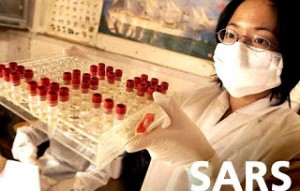Dr. Loletta Kit-Ying So from the Pamela Youde Nethersole Eastern Hospital in Hongkong reported on May 10, 2003 in the medical journal The Lancet (Lancet 2003;361:1615-1617) about their experience with early SARS treatment. Key to the success of this group is early recognition and early treatment of SARS. They found that high doses of corticosteroids to control the inflammatory reaction of the airways coupled with the antiviral antibiotic ribavirin has meant a breakthrough in the treatment of SARS. They have treated 50 patients with the new combination protocol.
Medication protocol:
Initially the patient is started on the fluoroquinolone antibiotic levofloxacine 500 mg once per day. This has an immunomodulating effect and keeps the virus at bay. Methylprednisolone at 1 mg per kg of body weight given three times per day is the corticosteroid used for 5 days, the gradually tapered to nothing over 16 days. The virus itself is treated with the antiviral drug ribavirin 400mg three times daily intravenously for three days or until the patient becomes stable, followed by tablets (1200mg twice per day) by mouth.
Outcome:
The good news with this protocol is that 70% of patients have left the hospital and are recovered; 27% are treated and are stable; three patients are mechanically ventilated (on a respirator), but stable. One patient who was an elderly diabetic patient has died of a heart attack.
There are no major side-effects of the treatment protocol. Some modifications are made with patients who have tuberculosis and with patients who are pregnant.
Here is an overview of SARS with links to the CDC.
Last edited October 26, 2014






